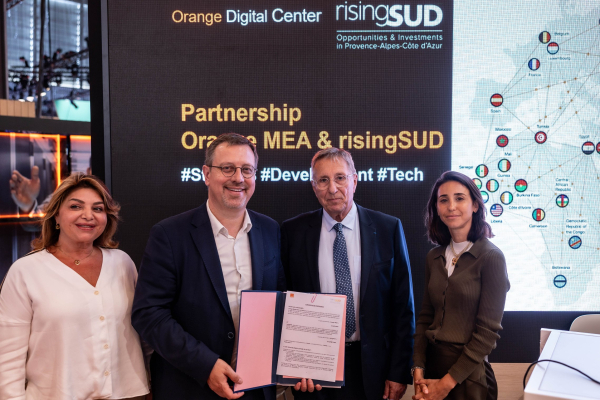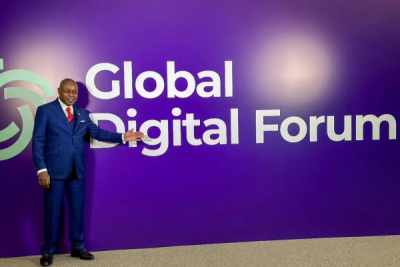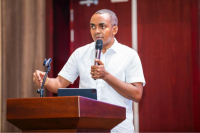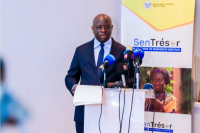
Tech (1105)
Powered by a spirit of innovation, a new wave of African startups is setting its sights on international growth. In France, the southern region is emerging as a strategic hub and gateway, offering these companies a favorable environment in which to scale and gain global exposure.
Orange Africa and Middle East (OMEA) announced a partnership with risingSUD, the regional development agency for France's Provence-Alpes-Côte d’Azur (PACA) region, on Wednesday, June 11. The agreement, signed on the sidelines of the Viva Technology trade show in Paris, aims to support the establishment of African startups in France.
Jérôme Hénique, CEO of Orange Africa and Middle East, stated that the partnership with risingSUD is a crucial step in OMEA's ambition to promote African innovation globally. He added that the initiative extends the support Orange already provides to startups through its Orange Digital Centers. By facilitating their establishment and acceleration in France, especially in the southern region, Orange empowers young African companies to accelerate their growth.
The three-year partnership seeks to strengthen collaboration between the innovation ecosystems of Africa, the Middle East, and southern France. Startups within the Orange Digital Centers (ODC) network will receive tailored support to expand their operations in France. This support includes assistance with project development, access to funding, and networking opportunities with local economic partners.
The PACA region, which already hosts over 500,000 businesses, aims to solidify its position as a natural link between Europe and Africa. In 2024, risingSUD has already helped 14 African companies establish themselves in southern France. One such company is Guépard, a Tunisian startup incubated by the ODC in Tunis, which now has a presence in Marseille.
This partnership aligns with OMEA's ongoing efforts to champion African digital entrepreneurship. Operating in 17 countries across Africa and the Middle East, the ODC network provides free access to various services, including digital training, incubation, acceleration, and funding for innovative projects.
Ultimately, this collaboration is expected to strengthen economic and technological ties across the Mediterranean while simultaneously enhancing the global competitiveness of African innovation ecosystems.
By Samira Njoya,
Editing by Sèna D. B. de Sodji
The launch of the 2025 STI Policy marks a bold step toward transforming Zambia into a knowledge-driven economy, where innovation is central to development, competitiveness, and national resilience.
The Ministry of Technology and Science announced on June 5 that it has officially launched Zambia’s 2025 Science, Technology and Innovation (STI) Policy—an ambitious national strategy aimed at harnessing the power of innovation to position Zambia as a competitive player in the global economy. The policy outlines a transformative roadmap that aligns science, technology, and innovation with the country’s inclusive and sustainable development goals.
Speaking at the launch event, the Minister of Technology and Science, Hon. Felix Chipota Mutati, MP, emphasized that the policy reflects the government's commitment to using innovation as a tool for real economic transformation. “When President Hakainde Hichilema says we need to export one billion dollars’ worth of beef, it means we must improve cattle genetics, accelerate disease eradication, and apply science to scale up our productivity,” Mutati said. “Similarly, producing 10 billion tons of maize means translating research into practical agricultural outputs that put food on the table.”
Hon. Mutati highlighted that the policy comes at a time when global economies are being reshaped by cutting-edge technologies such as Artificial Intelligence, robotics, green energy, biotechnology, and space science.
The 2025 STI Policy rests on several strategic pillars. In the area of Research and Development (R&D), over K3 billion will be invested to strengthen Zambia’s national R&D ecosystem. This includes establishing national research priorities, upgrading scientific infrastructure, and creating a centralized database of ongoing research initiatives. Priority institutions will be empowered to carry out applied research aligned with Zambia’s economic and social goals.
For Artificial Intelligence and Emerging Technologies, the government has allocated K8 million to develop regulatory frameworks, ethical standards, educational programs, and awareness campaigns. These efforts aim to position Zambia as a regional hub for AI innovation.
The policy also introduces a robust framework for technology commercialization, which includes the creation of five new technology transfer offices, innovation hubs, and science parks. A national startup database and commercialization guidelines will support the growth and scaling of technology-driven enterprises across the country.
In terms of human capital development, the policy targets the training of at least 500 postgraduate students in STEM (Science, Technology, Engineering, and Mathematics) fields through scholarships, exchange programs, and mentorship. It also seeks to strengthen engagement with the Zambian diaspora and expand knowledge systems rooted in local traditions.
A major component of the policy is the preservation and development of indigenous knowledge systems. Legal frameworks and dedicated R&D centers will be established to protect and advance local innovations. The government also plans to increase Zambia’s Gross Expenditure on R&D (GERD) from the current 0.28% to 0.50% of GDP by 2029.
Zambia’s economy has long relied on commodity exports, particularly copper, which makes up around 70% of export earnings. The STI Policy provides a pathway to economic diversification, particularly in sectors such as agriculture, manufacturing, and healthcare, by supporting applied research, digital transformation, and technology commercialization.
Hikmatu Bilali
The Djiboutian government aims to position the country as a regional hub for AI innovation in the coming years. As part of this effort, a call for applications has been launched to recruit a national expert tasked with drafting the future national artificial intelligence strategy.
Djibouti's Ministry of Digital Economy and Innovation (MDENI), in partnership with the United Nations Economic and Social Commission for Western Asia (UNESCWA), announced on Sunday, June 8, the opening of applications for a National Artificial Intelligence Expert. This recruitment is a key step in developing the country's national AI strategy.
The chosen expert will be crucial in shaping the strategy by providing technical and analytical expertise. Their responsibilities include assessing Djibouti's current AI capabilities, identifying priority sectors for AI applications, holding consultations with local stakeholders, and crafting recommendations that align with international best practices.
This initiative highlights the government's goal to equip the country with a clear and structured AI strategy. The aim is to guide the development and ethical, inclusive, and secure use of AI across vital sectors. The upcoming national strategy must also address challenges related to education, research, data governance, and innovation.
The position is open to qualified Djiboutian specialists in artificial intelligence, digital policy, technological innovation, or information technology. Applications close on Monday, June 23.
By Samira Njoya,
Editing by Sèna D. B. de Sodji
In the Face of Rising Digital Sovereignty Challenges, Congo Calls for Stronger Africa–Russia Cooperation. Léon Juste Ibombo advocates for a partnership-based approach built on skills exchange, sovereign technologies, and capacity building.
Congo's Minister of Posts, Telecommunications and the Digital Economy, Léon Juste Ibombo (photo), called for pragmatic cooperation between Africa and Russia, emphasizing digital sovereignty as a central challenge. He made these remarks during the "Russia–Africa: Shared and Sustainable Digital Sovereignty" session at the Global Digital Forum 2025, held June 5-6 in Nizhny Novgorod.
In his address, Ibombo outlined six priority areas for collaboration. He advocated for the transfer of skills in artificial intelligence, cybersecurity, and big data. He also proposed the development of shared computing centers for sovereign data governance, and the co-design of open-source solutions tailored to African needs. Other key areas included exchanges on digital taxation and industrial traceability, the organization of joint training programs, and the alignment of African and Russian positions within international digital regulatory bodies.
Congo's appeal comes as several African countries have already begun digital cooperation with Russia. Zimbabwe, for instance, has implemented an e-governance program with Moscow to boost public administration efficiency and combat corruption. Angola has signed a digital agreement with Russia covering fiber-optic networks, telecommunications satellites—including the AngoSat-2 project—and cybersecurity. Furthermore, the expansion of Russia's sovereign software MyOffice in several African nations, such as Cameroon, the Democratic Republic of Congo, and Guinea, signals a clear push for digital independence.
Russia holds a significant technological advantage, with established expertise in cybersecurity, sovereign software development, and sensitive data infrastructure. Through its existing digital partnerships, Russia offers Africa alternative solutions to the model of major Western platforms, while also aiming to train African operators in best practices.
This partnership could move Africa closer to a more autonomous digital model, built on dedicated infrastructure, strengthened local skills, and increased sovereignty in international negotiations. By diversifying its technological partnerships, the continent is positioning itself to build robust, sustainable, and politically independent digital foundations.
By Samira Njoya,
Editing by Sèna D. B. de Sodji
With the launch of its nanosatellite Gaindesat-1A, Senegal has taken a major step forward in its space strategy. The country now aims to position space as a strategic lever for development and sovereignty.
Senegal's General Staff of the Armed Forces (EMGA) and the Senegalese Space Studies Agency (ASES) signed a five-year memorandum of understanding on Thursday, June 5, to develop the country's first national satellite constellation. This strategic initiative aims to enhance technological sovereignty and strengthen national defense capabilities.
"By creating ASES, the Senegalese government has made its ambitions clear: to position the space sector as a cross-cutting lever for impact across all domains—starting with security," said Maram Kaïré, Director General of ASES, praising the government’s forward-thinking approach.
The project involves deploying a constellation of nanosatellites. These small, orbiting satellites will work in coordination to provide continuous and comprehensive coverage of Senegal’s territory. Key applications include Earth observation to support security, environmental monitoring, and natural resource management.
European aerospace company Prométhée Earth Intelligence will provide technical support. Prométhée, which specializes in satellite technology and Earth observation data analytics, will collaborate closely with Senegalese authorities to co-develop a sovereign, sustainable, and inclusive space capability.
Once operational, the satellite constellation will enable real-time surveillance of national territory. This will meet security needs while also supporting biodiversity protection, risk prevention, and economic development. The technology is expected to have applications in areas such as precision agriculture, land use planning, and infrastructure management.
With fewer than 50 African nations possessing national satellites, this agreement represents a major step forward in Senegal’s technological sovereignty. It is part of the broader SenSAT national space program, which seeks to establish autonomous space capabilities for the country.
Beyond security, the project is poised to drive innovation, create high-value jobs, and enhance Senegal’s control over geospatial data, solidifying space as a pillar of long-term strategic independence.
By Samira Njoya,
Editing by Sèna D. B. de Sodji
Senegal’s start-up ecosystem is rapidly expanding, driven by both government and private initiatives. Technological innovation is seen as a strategic lever to boost the economy and tackle development challenges.
Senegal's Ministry of Communication, Telecommunications and the Digital Economy (MCTN) and U.S. tech group Meta announced Thursday, June 5, the launch of Llama Impact. This new acceleration program aims to support Senegalese startups leveraging open-source artificial intelligence (AI) in high-impact sectors.
The program targets early-stage ventures, focusing on innovations in healthcare, including telemedicine, diagnostic tools, and AI-driven medical advice. It also emphasizes agriculture, covering areas like soil analysis, crop monitoring, and market access, as well as education, with a focus on EdTech platforms and digital training. A "Carte Blanche" category is additionally available for high-potential projects outside these traditional domains.
Selected startups will participate in six weeks of hands-on training, technical mentorship, and intensive development sessions. The program will conclude with a demo day, where participants will present their solutions to investors and compete for up to $25,000 in non-dilutive funding. A six-month post-program support phase will follow to consolidate progress and facilitate access to further opportunities. Applications for the program are open until June 27.
This initiative is part of Senegal's broader New Technological Deal, the country's national digital strategy unveiled in February. The plan aims to designate 500 innovative startups, train 100,000 digital graduates annually, and create 150,000 direct jobs in the sector by 2034. It also seeks to establish Senegal as a leading innovation hub in Francophone Africa.
By encouraging local startups to adopt open-source AI, the program intends to reduce reliance on foreign technologies, foster homegrown innovation, and strengthen the country's digital sovereignty. Despite these efforts, challenges persist, particularly concerning access to financing, technical supervision, and the scaling of developed solutions.
By Samira Njoya,
Editing by Sèna D. B. de Sodji
Tanzanian authorities are considering the temporary or permanent blocking of social media platform X, formerly known as Twitter, following a series of cyberattacks against national institutions since last month. The attacks have resulted in the spread of inappropriate content across the network.
Tanzania officially confirmed on Wednesday, June 4, it had blocked access to X (formerly Twitter). The government cited the spread of pornographic content, which it deemed contrary to the country’s laws and cultural values. This move comes amid rising political tensions ahead of general elections scheduled for October.
Information Minister Jerry Silaa stated that X's policy allowing explicit sexual content, including homosexual content, violates Tanzanian law and tradition. Speaking to a local television channel, Silaa said the platform's practices contradict national regulations. He added that the government's decision aims to protect consumers and ensure all online platforms comply with domestic laws.
The ban on X follows a series of cyberattacks on May 20. During these incidents, official government accounts, including those of the Tanzanian police and tax authority, were hacked. The attackers posted pornographic images and falsely announced the death of President Samia Suluhu Hassan. Although authorities downplayed the incidents, they reignited concerns about cybersecurity and freedom of expression in the country.
With approximately 621,100 users in 2024, X plays a significant role in Tanzania, facilitating information access, free speech, and economic development. Its shutdown threatens to disrupt communication channels among citizens, media outlets, institutions, and small businesses that depend on the network to inform, mobilize, or sell services.
The restriction on X occurs just months before a critical election, raising concerns for democratic debate. Economically, this move aligns with a broader trend of digital crackdowns across sub-Saharan Africa, which cost the region an estimated $1.56 billion in 2024, according to Top10VPN. This highlights the damaging impact of such measures on digital growth and Tanzania's international reputation.
By Samira Njoya,
Editing by Sèna D. B. de Sodji
Cameroon is facing significant financial losses due to the manual management of non-tax revenues, prompting the government to accelerate the digitalization of public payment systems. This push aims to enhance transparency and improve efficiency in revenue collection.
Cameroonian Prime Minister Joseph Dion Ngute (photo) has issued a three-month deadline for several government departments to exclusively use Trésor Pay, the digital platform for collecting non-tax revenues. The measure, outlined in an order signed on Wednesday, May 28, aims to bolster transparency, traceability, and the security of financial flows within public administration.
Developed by the Ministry of Finance, Trésor Pay enables citizens to make non-tax payments online via mobile money, bank cards, or Campost counters. It is progressively replacing manual procedures, which have frequently been sources of fraud, administrative delays, and financial losses for the Treasury. The platform also ensures receipt authentication and provides a real-time tracking system, facilitating monitoring and communication between the administration and users.
This decision comes amid a backdrop of poor performance in mobilizing non-tax revenues. For 2025, Cameroon is targeting collections of 361 billion CFA francs ($638 million), despite the actual potential being estimated at nearly 600 billion CFA francs. This shortfall is primarily attributed to fragmented payment channels, the prevalence of manual procedures prone to irregularities, a lack of transaction traceability, and insufficient coordination among relevant departments. These weaknesses undermine the system's efficiency and hinder optimal mobilization of non-tax resources.
The stakes are high for public finances. By making Trésor Pay mandatory, the government aims to improve governance, maximize domestic resources, and fully align with its digital transformation strategy. In the long run, this reform is expected to enhance the state's capacity to finance its public policies while simultaneously modernizing services for citizens.
By Samira Njoya,
Editing by Sèna D. B. de Sodji
Since launching its digital strategy, Senegal has ramped up initiatives to modernize its public administration, boost transparency, and bring government services closer to citizens through digital tools.
Senegal's Minister of Finance and Budget, Cheikh Diba (photo), officially launched SenTrésor, a new digital platform for public payments, on Monday, June 2, in Dakar. The project, developed by the General Directorate of Public Accounting and the Treasury, aims to modernize and streamline financial transactions between the state and its citizens.
According to Diba, "beyond the simple digitization of payments, SenTrésor marks the beginning of a new model of interaction between the state and its citizens, based on simplified administrative procedures. SenTrésor addresses the challenge of mass payments, which require large personnel deployments and generate numerous constraints."
The platform centralizes public payments, including salaries, social assistance, scholarships, and emergency relief, through mobile money services. A network of "investigators" deployed nationwide, particularly in rural areas, identifies beneficiaries, collects data, verifies eligibility, and registers them in a secure database. Payments are then made automatically, eliminating the need for beneficiaries to travel.
Since its pilot phase began on March 28, 2025, SenTrésor has served over 44,000 people, with total disbursements exceeding 4 billion CFA francs (approximately $6.9 million). The platform has demonstrated high reliability and traceability.
The launch of SenTrésor aligns with Senegal’s broader push to digitize public services, consistent with the country's Vision 2050 and its New Technological Deal. It complements other recent government-led digital initiatives such as e-solde, Tabax, and Jubbanti. All these efforts are designed to boost administrative efficiency, improve access to public services, and accelerate digital inclusion.
By enabling direct payments from the state to citizens, SenTrésor is expected to help lower administrative costs, combat fraud, and promote financial inclusion, especially for those excluded from traditional banking networks.
However, several challenges could hinder the platform’s widespread adoption. These include limited access to mobile internet, uneven network coverage in rural areas, the digital divide, and public trust in the security of government digital platforms. As of early 2025, an estimated 11.3 million people in Senegal were using the internet, representing an online penetration rate of 60.6%.
To address these challenges, authorities will need to support SenTrésor’s rollout with awareness campaigns, partnerships with mobile network operators, and the strengthening of digital infrastructure in the most remote areas.
By Samira Njoya,
Editing by Sèna D. B. de Sodji
Tech startups are at the heart of Morocco’s innovation strategy. By connecting them to global markets, the country aims to establish itself as a digital hub in Africa.
Technopark Maroc, a business incubator for technology companies, and Plug and Play, a global innovation platform, signed a partnership agreement on Monday in Casablanca to launch an acceleration program for Moroccan startups.
The agreement was signed in the presence of Amal El Fallah Seghrouchni, Minister Delegate in charge of Digital Transition and Administrative Reform, and has the strategic support of the Ministry of Economy and Finance.
Under the partnership, an accelerator will be established within Technopark Casablanca to support more than 60 high-potential Moroccan startups over two years. The program will offer an intensive three-month curriculum focused on skills development, access to funding, connections to international markets, and preparation for scaling abroad.
This initiative aligns with Morocco’s digital strategy, Morocco Digital 2030, which aims to create 3,000 start-ups by 2030, including 1,000 by 2026, and to raise 7 billion dirhams ($761 million) in funding. The strategy depends on a dynamic ecosystem and strengthened public-private partnerships.
According to the Partech 2024 report, Morocco ranks sixth in Africa for tech fundraising, raising $82 million, which represents 75% of tech financing in North Africa and 36% in Francophone Africa. The Plug and Play program seeks to build on this momentum by encouraging investment, fostering local innovation, and integrating start-ups into global technology networks.
By hosting a world-renowned accelerator at the heart of Technopark, the project aims to structure support for young innovative companies, attract foreign investment, and enhance Morocco’s appeal as a hub for tech talent.
Plug and Play operates in more than 60 countries and will provide Moroccan start-ups access to a global network of over 550 corporate and technology partners, reinforcing Morocco’s ambition to become a leading innovation player on the African continent.
By Samira Njoya,
Editing by Sèna D. B. de Sodji
More...
• Tunisia urges firms to join e-invoicing before July 2025 sanctions.
• Applies to state-linked, large, pharma, and fuel firms.
• Aims to cut tax fraud; digital gaps persist.
Tunisia's General Directorate of Taxes (DGI) issued a warning last Saturday, urging all unregistered Tunisian companies to enroll in the national electronic invoicing system. The directive comes ahead of sanctions for non-compliance set to take effect in July 2025, marking a crucial phase in the country's digital tax reform.
This mandatory registration extends to a broad spectrum of economic players, including businesses engaged with the State or local authorities, those operating under the Directorate of Large Enterprises (DGE), and companies involved in interprofessional transactions within the pharmaceutical and hydrocarbon sectors, excluding retail trade. To comply, affected firms must register through the Tunisia TradeNet (TTN) platform, which serves as the official technical operator for the system’s deployment. The DGI's twin objectives are to bolster the traceability of commercial operations and to streamline tax procedures through automated data processing.
This initiative is a cornerstone of Tunisia's drive to modernize its tax system, impelled by both domestic imperatives and international commitments to transparency and sound governance. The digitalization of invoicing complements a series of existing measures designed to combat tax evasion, a persistent issue estimated to cost Tunisia approximately 3 billion dinars annually. It underscores the government's resolve to enhance tax efficiency and tighten control over commercial transactions.
In the long term, the widespread adoption of electronic invoicing has the potential to fundamentally reshape the relationship between the tax administration and businesses. If implemented effectively, this reform is expected to significantly curb fraud, simplify audit processes, and ultimately restore greater confidence in Tunisia's tax system.
However, the ambitious rollout of electronic invoicing faces structural challenges. While Tunisia’s internet access rate reached 84.9% in 2025, a 5% increase from the previous year, and mobile phone penetration stands at about 136.5%, indicating widespread mobile connectivity, disparities persist. Notably, digital tool adoption remains low in rural areas and among small businesses. These gaps highlight an urgent need for enhanced support, including targeted training and technical assistance, to ensure that all segments of the economic landscape are fully included in this crucial digital transition.
By Samira Njoya,
Editing by Sèna D. B. de Sodji
• The Democratic Republic of Congo unveiled a new biometric passport featuring an RFID chip, polycarbonate pages, and advanced security features
• The initiative supports digital sovereignty, online applications to digitize civil registry processes, and reduce offline dependency.
The Democratic Republic of Congo (DRC) launched its new biometric passport on Tuesday, May 27, a move aligning the nation with international standards and bolstering its digital sovereignty. The document, a result of government-led reforms, is a key component of a broader initiative to secure citizen identities.
Available to the public starting June 5, the passport integrates a contactless Radio-Frequency Identification (RFID) electronic chip that securely stores the holder's biometric data. It also features an ultra-durable polycarbonate page and incorporates advanced visual security elements, including holograms, UV inks, and watermarks, to virtually eliminate forgery. The passport's page count has expanded from 32 to 38, offering increased capacity for frequent travelers.
According to Thérèse Kayikwamba Wagner, Minister of State for Foreign Affairs, the document complies with International Civil Aviation Organization (ICAO) standard 39794. This adherence, she noted, ensures both the free movement of Congolese citizens and the protection of their personal data.
The new passport’s incorporation of advanced biometric technologies enables reliable and immediate identification, serving as a robust deterrent against document forgery, identity trafficking, and impersonation, particularly in a regional environment marked by escalating cyber threats.
The passport's introduction is part of the DRC's 2024-2028 Government Action Program, which prioritizes the progressive digitization of public services and the integration of advanced technologies into official documents. Congolese citizens can now submit applications online, with payment options including electronic transfers or through Equity BCDC Bank. Biometric capture centers are currently being established in provincial capitals across the country.
This transition to a digitized system aims to streamline procedures, reduce processing times, and enhance the reliability of civil registry databases, addressing the fact that nearly 70% of travel document procedures in the DRC are still conducted offline.
Ultimately, this biometric passport is expected to facilitate digital integration, providing secure access to government services such as e-visas and online issuance of civil status documents. It could also contribute to the development of an interoperable national database, a valuable tool for social planning, migration policy, and the enhancement of border services.
However, realizing these ambitions will necessitate the DRC establishing a robust legal framework for data protection and building a trustworthy, interconnected digital identification infrastructure that safeguards citizens' rights in the era of digital transformation.
By Samira Njoya,
Editing by Sèna D. B. de Sodji
Access to the internet is now a necessity. It improves access to education, healthcare, financial services, and job opportunities. This milestone in Kura is a powerful example of how rural connectivity can directly transform lives—and why it’s urgently needed across Nigeria.
For the first time, the 12,000 residents of Kura, a rural community on the outskirts of Abuja, have access to mobile network and internet services, Minister of Communications, Innovation and Digital Economy, Dr Bosun Tijani, announced on May 29. This development is thanks to a landmark partnership between a rural connectivity initiative, Huawei, and telecom provider Glo.
The new telecom tower was deployed in just two days. Within 48 hours of going live, Kura residents consumed 81.4GB of data and logged 13,144 minutes of voice calls. The site has maintained 100% uptime, with peak LTE download speeds reaching 5.0 Mbps, the minister revealed.
Beyond personal connectivity, the project also supports vital community infrastructure. The local health centre is now linked to global doctors via Huawei’s telemedicine solutions, enabling remote diagnostics and consultations. Meanwhile, the school in Kura is equipped with digital classroom technology, providing students with access to high-quality online learning resources and global educational content for the first time.
A free public WiFi zone has also been launched, ensuring that the entire community, not just those with mobile devices, can benefit from the new digital access.
This pilot is a blueprint for future deployments across Nigeria’s underserved regions. As the project scales, millions more Nigerians could soon experience the transformative power of digital inclusion, from better education and healthcare to economic opportunities and beyond.
Over 20 million Nigerians still live without internet access, according to the Minister. To close this digital gap, the Federal Government has launched a major initiative to deploy 7,000 new telecommunications towers across underserved communities, aiming to connect those who remain entirely cut off from mobile and internet services.
Hikmatu Bilali
• Liberia launches digital health insurance pilot for vulnerable groups
• MoU signed by LTA, NIR, and NICOL to oversee digital infrastructure
The Liberian government is embarking on a pilot program to expand health insurance access for its most vulnerable citizens by leveraging digital technologies. A memorandum of understanding to launch the initiative was signed on Tuesday, May 27, by the Liberia Telecommunications Authority (LTA), in partnership with the National Identification Registry (NIR) and the National Insurance Company of Liberia (NICOL).
The pilot project, set to begin enrollment on July 1, will initially target 5,000 individuals. "The MoU is a pilot project that will provide coverage for groups often underprivileged, including persons with disabilities, unemployed women and youth, pregnant women without support, and children engaged in street trading," the LTA stated in a Facebook post.
Under the agreement's terms, the collaboration will utilize digital identification systems provided by the NIR to ensure robust beneficiary verification and efficient data management. The LTA will oversee the technological infrastructure, guaranteeing secure communication and high-quality service delivery.
This initiative aligns with President Joseph Nyuma Boakai's pledge during his inaugural State of the Nation address to establish a national health insurance scheme, aiming to provide affordable healthcare to the country's most disadvantaged. Abdullah Kamara, acting chairman of the LTA, highlighted that studies in other nations demonstrate technology's potential as a catalyst in this domain. Liberia is also pursuing a broader digital transformation agenda.
Officials emphasize that this is currently a pilot program. A successful outcome will allow for comprehensive evaluation of enrollment procedures, service quality, and beneficiary feedback, with the goal of refining the system for a potential large-scale rollout.
However, limited digital penetration, particularly in Liberia's rural areas, could pose implementation challenges. Data from the International Telecommunication Union (ITU) indicates that internet penetration in Liberia stood at just 23.5% in 2023. The ITU also reported that 59% of Liberians owned a mobile phone, though it did not specify the number of smartphone users.
By Isaac K. Kassouwi,
Editing by Sèna D. B. de Sodji















